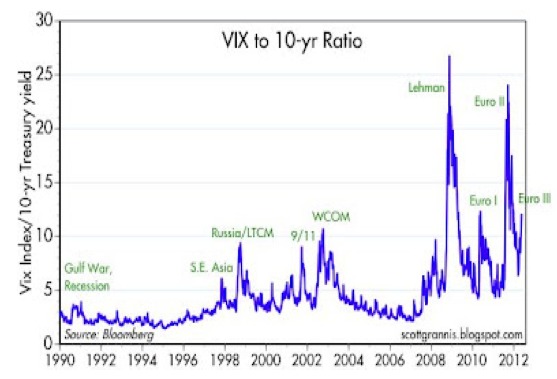 Author: Kris Tuttle
Author: Kris Tuttle
Covestor model: Soundview Technology
Disclosure: Long FB
“Be fearful when others are greedy; be greedy when others are fearful.” – Warren Buffett
Investment Outlook Update
Investors watching the behavior of the financial markets carefully these days may be excused if they feel a bit like Bill Murray’s character in the movie Groundhog Day.
For the third consecutive year, investors are waking up to a time in the not-too-distant future when Greece could exit from the Eurozone and the disintegration of Europe commences with financial dislocations reverberating throughout the world that nobody can foretell or predict.
Financial markets are discounting mechanisms, and right now there is a large degree of pessimism being priced in. We can see this in the chart below, which shows the ratio of the VIX index to the 10-year Treasury yield.

The ratio can be seen as a proxy for the degree of fear priced into financial markets. It is also a good proxy for what traders refer to as “risk off” and “risk on” environments. The VIX typically rises as fear increases in equity markets and generally the 10-year Treasury yield declines as fear increases and U.S. government bonds are viewed as a safe haven during troubled economic and financial times. An increase in the ratio signifies rising fear or “risk on” environment and a decline indicates subsiding fear or “risk off.”
As the chart shows, the ratio has been trending up as concerns in Europe about disintegration have grown. As in the previous two episodes with the Euro (labeled on the chart “Euro 1” and “Euro 2,” the VIX/10-year ratio has risen sharply in recent weeks. The increase in the ratio has coincided with a sell-off in equities and signified a “risk off” environment. And also as in the previous two periods, small and mid-capitalization stocks have performed poorly relative to bigger cap companies and the broader markets in general.
We mention this fact because the Soundview Technology model is concentrated in smaller and mid-cap companies, and the portfolio can be expected to underperform in “risk off” market environments.
Having seen this movie before, we know that resolution of the issues in the Eurozone – when they come – will likely result in a “risk on” environment. In a “risk on” market, we can expect the Soundview Technology model to outperform the broader markets.
We do not adjust our investment process to accommodate mood swings in the market. Our investment process is designed to uncover value that exists well beyond any given quarter. As longer term investors focused on technology, we have to contend with gyrations – sometimes extreme gyrations – in financial markets.
As professional investors that have been around Wall Street for nearly three decades, we’ve seen our share of panics, meltdowns and crises. And during each one of those, we have held firm to our investment process and viewed such periods as an opportunity to accumulate undervalued companies that meet our investment criteria.
We’ve been accumulating shares of companies in our model that have experienced sharp sell-offs and are trading significantly below their intrinsic value. Our valuation analysis – which is fundamental to our investment process – suggests there is a large amount of upside in many of the positions we hold in the Soundview Technology model. The average upside to our estimates of intrinsic value is over 135%. This does not mean that the model will necessarily double over the next 3, 6 or 12 months. What our analysis suggests is that there is the potential for significant appreciation of this portfolio in the future.
Our crystal ball may not be as clear as Punxsutawney Phil’s, but our analysis tells us there is a good deal of value in emerging technology. One day the market will wake up from its Groundhog’s Day experience and it will be “risk on.” When that day comes, nobody can say for sure. But we are positioned for that day and are confident it will come – hopefully sooner rather than later.
Changes
During May, we added to some existing positions on weakness and also one new position to the portfolio:
Facebook (FB) – We have worked on FB for quite some time and awaited the IPO with a secret hope that it would decline. And so it did, and we took an initial position post-swoon. We expect to add a bit more at near current levels. Here are a few reasons:
- Facebook has certainly become the dominant platform for social sharing in the consumer segment. This simple fact means that many related services will end up being built on Facebook, one way or another. Their platform is their main advantage.
- We’re in the early stages of understanding how to leverage social information to provide better search results, ideas, content and interaction. As Clay Shirky says, “it’s not information overload, it’s filter failure” – and our view is that the social network will provide the ultimate filter for 90% of internet users.
- The business model is very attractive. The company has admitted to being challenged in increasing monetization, especially in mobile, but they are generating substantial growth and high cash flow margins.
- The valuation is attractive. Our intrinsic value estimate for 2012 is $50 and for 2013 it is $60.
- We recognize that the company will have to execute and acquisitions are likely to occur, but so far we are willing to give the management team the benefit of the doubt. Like most investors, we will be watching their next moves carefully.




